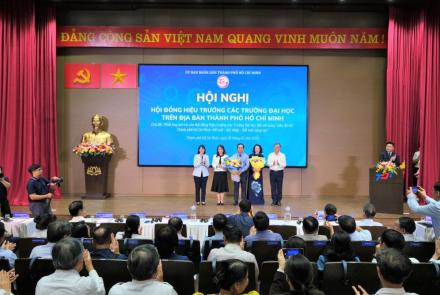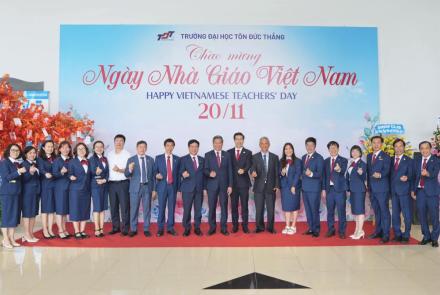Ton Duc Thang University, in Cooperation with the Ministry of Education and Training, Successfully Held a Conference to Collect Feedback on the Draft Project “Supporting Students and Pupils in Entrepreneurship for the 2026-2035 Period”
On August 22, 2025, the Ministry of Education and Training (MOET) organized a conference at Ton Duc Thang University (TDTU) to gather feedback on the draft project ‘Supporting Students and Pupils in Entrepreneurship for the 2026-2035 Period.’ The event was attended by representatives from the MOET; the Government Office; the Ministry of Finance; the Central Committee of the Ho Chi Minh Communist Youth Union; along with nearly 150 delegates from relevant ministries and agencies; representatives of Departments of Education and Training, experts, as well as representatives from various universities, academies, colleges of education, and vocational education institutions.
In his opening remarks at the conference, Dr. Tran Van Dat – Deputy Director General of the Department of Students Affairs, MOET – emphasized: “In the new context, especially after the Politburo issued strategic resolutions and conclusions such as Resolution No. 57-NQ/TW dated December 22, 2024, on breakthroughs in the development of science, technology, innovation, and national digital transformation, along with several other recent resolutions; the continued development of the Project on Supporting Students and Pupils in Entrepreneurship for the 2026-2035 Period is not only an urgent requirement but also a strategic mission to cultivate a young, high-quality, innovative workforce capable of shaping the future.”
For the 2026-2035 period, the MOET sets the goal of building a sustainable startup ecosystem, aligned with digital transformation, green development, and global integration. The conference focused on discussing two main groups of issues:
- Experience exchange in implementing the Project “Supporting Students and Pupils in Entrepreneurship” among various institutions; Presentation of startup models from some countries.
- Discussion on the development of projected tasks and solutions for the 2026-2035 period, based on scientific foundations and practical implementation experiences of higher education institutions both domestically and internationally.

In general, the draft Project for the 2026-2035 period points out that, in the current context, fostering innovative entrepreneurship among students is a vital task that requires breakthrough policies, strong resources, and comprehensive solutions. Entrepreneurial activities should be implemented through a tiered model: focusing on creative thinking, foundational skills, and early career orientation at the high school level; and integrating innovation, science and technology, digital transformation, green transition, and the commercialization of ideas at vocational and higher education levels.
The Project aims to strongly promote the spirit and culture of entrepreneurship with a distinctive Vietnamese identity among students, turning each learner into a center of creativity and a pioneering force in knowledge-based economic growth. By 2030, it is expected that 90% of university students, 75% of students in vocational education institutions, 25% of high school students, 15% of secondary school students, and 10% of primary school pupils will be equipped with sufficient knowledge and skills in financial management, innovation, entrepreneurship, digital skills, and artificial intelligence. By 2035, these figures are projected to rise to 95% for university students, 85% for students in vocational education, 35% for high school students, 20% for secondary school students, and 15% for primary school pupils. Notably, 80% of university graduates will meet digital skills and innovation standards at a proficient level or higher, in accordance with the national competency framework or international standards.
To realize these objectives, the Project proposes several groups of tasks and solutions, including: improving the mechanisms and policies to support entrepreneurship; enhancing the effectiveness of information and communication efforts; adjusting the curricula and developing training materials on entrepreneurship; establishing a team of professional consultants and startup support staff; investing in infrastructure and facilities to serve the startup ecosystem within educational institutions; diversifying funding sources for the Project; while at the same time strengthening international cooperation, as well as partnerships with enterprises and alumni.
Following the directives delivered by representatives of the leaders from the MOET, representatives from educational institutions and Departments of Education and Training also presented papers sharing the actual implementation status and practical experiences of student entrepreneurship at their respective institutions and localities.
Dr. Duong Thi Thuy Van – Head of the Department of Testing and Quality Assessment, concurrently Director of the Center for Innovation and Technology Transfer at TDTU – delivered a presentation at the conference, in which she proposed a model for establishing internal venture capital funds (seed/angel funds) within core universities, mobilizing capital from alumni and enterprises. In addition, TDTU proposed a revolution in creative spaces through the adoption of international models such as the Design Factory (an interdisciplinary collaboration space) and, particularly, the Sandbox Campus. This mechanism would allow students to experiment with new products and services directly on campus under legal protection, creating an environment where they can ‘dare to think, dare to act’ without fear of risk. Furthermore, TDTU suggested the development of a national Student Entrepreneurship Competency Index to measure the actual effectiveness, and a strategic shift from focusing on the ‘quantity’ of events to the ‘quality’ of startup projects. Most notably, TDTU emphasized the need to build a culture of ‘risk acceptance and encouragement of failure,’ considering it a fundamental cornerstone of all aspects of innovation.

In a lively and constructive atmosphere, the conference received numerous practical contributions and insights, ranging from management experience to professional perspectives, helping to complete the draft Project. This active exchange demonstrated the shared determination of regulatory bodies, educational institutions, and experts to build a comprehensive startup ecosystem, opening up new opportunities for Vietnamese students.
TDTU is one of the pioneering higher education institutions in promoting innovation and entrepreneurship, while also committing to sustainable action aligned with the 17 United Nations’ Sustainable Development Goals. For many consecutive years, TDTU has consistently built a comprehensive startup ecosystem, where every activity is directed toward equipping students with the ‘dare to think, dare to act’ mindset and the capacity for global integration. The Job Fair and Alumni Day are two annual events organized at TDTU, providing students with opportunities to easily connect with businesses and multidisciplinary startup experts. These events not only bring students valuable knowledge and practical experience but also inspire their creativity, foster the ‘dare to act’ mindset, and expand their professional networks with enterprises. The University also regularly encourages and organizes competitions to discover innovative startup ideas among TDTU students.
Through this conference, TDTU not only joined hands with the MOET but also reaffirmed its commitment to cultivating a generation of dynamic, creative, globally integrated, and socially responsible students. With its modern and comprehensive facilities capable of meeting the requirements for hosting large-scale events, TDTU has become the venue for numerous significant national and international events. Earlier, in March 2025, TDTU also collaborated with the MOET and the Ho Chi Minh City Department of Education and Training to successfully organize the National Science and Engineering Competition for Secondary School Students for the academic year 2024-2025.



